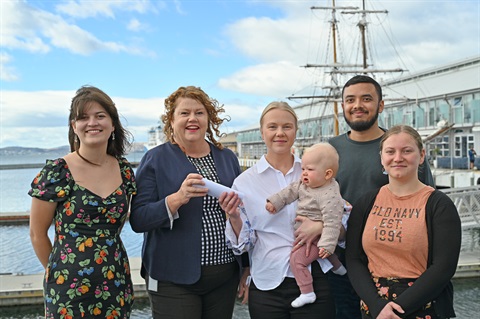
Development of connected, safe and green corridors for walking and cycling that also help cool the city; phasing out the use of fossil fuels in Council operations; and providing public spaces for use during extreme climate events – these are some of the recommendations to come out of the City of Hobart’s inaugural Climate Assembly.
The City of Hobart’s Climate Assembly is a Tasmanian first and a pivotal event in shaping Council and communities’ response to the climate and biodiversity emergency.
The assembly participants, selected through a widely advertised expression of interest process, to represent the diversity of Hobart.
The assembly group were a representative sample of the Hobart population in terms of age, gender, cultural background, and climate change knowledge.
The Assembly, held over four days across two weekends, was a forum for in-depth briefings, robust discussions and collaborative decision-making.
It resulted in ten prioritised community recommendations aimed at addressing the urgent challenges posed by climate change and biodiversity loss.
Reflecting on the significance of the Assembly, Hobart Lord Mayor Anna Reynolds said, “Climate change is the most significant issue of our generation and will impact all of our lives in some way.
“The only way to reduce the impact this is for everyone to work together and cut the pollution that’s causing such rapid change to our world.
“The Hobart Climate Assembly has given us the clear direction on what the community would like to see us do in Hobart, and what we can do together.
“Many climate change initiatives also have extra benefits such as reducing energy costs, creating new job opportunities, and creating cleaner air.”
Rahat Md Imadul Islam, a business owner, father, and community volunteer from Lenah Valley, said Hobart residents could all positively impact on climate change. “We are short-term guests in this lovely world,” he said.
“We wouldn’t like a guest who doesn’t look after a generous host.
“The assembly opened our eyes to the facts and inspired us to become better guests in a planet we call home.”
The recommendations put forth by the Assembly encompass a wide array of actions aimed at mitigating the impacts of climate change and enhancing community resilience.
Top priorities identified by the Assembly include:
- Develop a network of connected and safe walkways, cycleways to encourage active transport (incl. footpath upgrades, pathways, trails and cycleways.
- Develop a network of green corridors throughout the city to increase tree cover, cool the city, improve liveability and movement.
- Stop selling offsets and giving someone else permission to pollute.
- Phase out fossil fuels from Council operations, including through assets, supply chains and investments.
- Develop a network of waterways, wetlands and blue corridors to improve irrigation and manage runoff from heavy rainfalls, reduce pollution/flooding.
- Implement fire management programs that improve biodiversity and bushland health.
- Advocate to develop a zero emissions public transport system that encourages usage through increased availability and better user experience.
- Provide safe and inclusive publicly accessible spaces for extreme climate-related events for priority communities and those who require support.
- Use planning, legislation and regulatory controls to reduce risk; and assess and improve critical infrastructure across the city to be climate ready.
- Provide support and financial incentives to households, businesses and neighbourhoods to electrify and retrofit.
North Hobart student Chloe Holley said the Climate Assembly was a successful, worthy project.
“It was incredible working so closely with the community, the council and experts to improve our city not just for climate readiness but also just for liveability,” Ms Holley said.
“Seeing the council members come along and see the work we were doing really made me feel like we were being heard and that what we’re saying is important.
“I think that it will be most important to target Hobart’s transportation, there are too many cars on the road and inadequate infrastructure for decent public transport, cycling and walking.”
The City of Hobart is committed to incorporating these recommendations into its strategic planning and decision-making processes, working collaboratively with the community to achieve meaningful and lasting outcomes in our fight against climate change.
Picture: Hobart Lord Mayor Anna Reynolds (second from left) receiving the Hobart Climate Assembly recommendations from community representatives.








